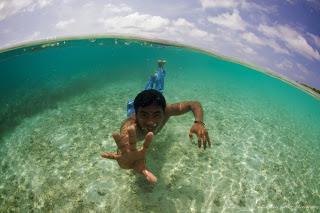
Let’s face it - we dive a LOT. We have to take care of ourselves...and especially our ears. It is no fun to join one of our diving expeditions and then have to sit on the boat while everyone els is diving. That’s no fun at all!
Here’s a look at the most common problems when clearing ears and how to solve them.
Congestion:
Stuffiness is by far the biggest barrier to ear clearing. Inflamed mucosa in the tubes shrinks the opening, making it harder to force air in and equalize the pressure, and too much sticky mucus can clog the openings, making it nearly impossible to open the tubes no matter what you do. A clear head is the ticket to clear ears.
Here’s what to do:
Careful while snorkeling - it can damage your earsFlush ’em out. Nasal irrigation systems like NeilMed’s Sinus Rinse or Ayr Sinus Rinse flush out sticky mucus, wash away irritants that inflame your mucosa, and stimulate the cilia (little broom-like hairs) in your nose to help them work better at keeping the passages clean and clear. In a study of 100 divers with ear-clearing troubles, 69 percent of them reported improvement after performing nasal irrigation. Sixty percent of those who routinely used oral decongestants during diving were able to use less or stop taking the pills altogether.
It sounds slightly disgusting. And maybe it is ...a little. But it doesn’t sting, and you feel an instant improvement. Irrigation also works dramatically better than saline sprays because it mechanically rinses out thick or crusted mucus in hard to reach places and reduces swelling in the mucosa, so you have more space for air to move in and out.
Drink up:
Dehydration contributes to thick, clumpy mucus. Drinking enough water so your urine is clear will help thin your mucus so it’s less sticky and the eustachian tubes will function better. Don’t worry - on all our boats you will have unlimited water throughout the day. You’ll want for water, but you still need to drink it!
Stub out the smokes:
Anyone who’s ever experienced a mucousy smoker’s cough knows that tobacco smoke irritates the mucosa and promotes more mucus production. Quitting smoking helps to clear your lungs-and your ears.
Give the dairy a miss:
Milk and other dairy products increase mucus production. "Avoid eating dairy for two days before you dive if you have trouble equalizing," says Frans Cronje, M.D., executive and medical director of DAN Southern Africa.
Avoid additives:
The same foods that can trigger migraine headaches also can contribute to congestion and ear clearing problems. Avoid red wine, chocolate, aged cheeses and foods containing additives like MSG (monosodium glutamate) and nitrites for a few days prior to diving.
Pop a pill:
Although recommended with caution and for no more than three to five days, when all else fails, 60 mg of pseudoephedrine (Sudafed) may do the trick. Be careful, however, as Sudafed can cause side effects that don’t mix well with diving such as a racing heartbeat and can even cause an obstruction of urine in men. Be sure your body can handle this medication before diving on it, and ensure not to overdose. Also, because it stimulates your central nervous system, it may influence the nitrogen absorbtion and increase your risk of oxygen toxicity. Experts advise to be careful taking it if you are planning dives deeper than 26 metres or using enriched air nitrox. Here at Wicked Diving we strongly discourage their
use on a liveaboard due to potential hazards.
-Wicked Diving